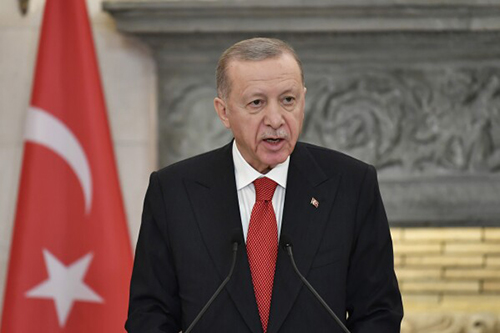|
Getting your Trinity Audio player ready...
|
Turkey’s membership in NATO has long been contentious, but recent developments underscore that the alliance must seriously reconsider its relationship with Ankara. Turkey’s obstruction of Sweden’s accession to NATO earlier this year is not merely a negotiation tactic—it’s a pattern of behavior that threatens the integrity of the alliance. While NATO leaders and the White House may celebrate Turkey’s belated agreement to Sweden’s inclusion, the core issue remains: Turkey continues to subordinate NATO’s broader strategic interests to its own material and political gain. This is no longer a question of tactical disagreements; it is a matter of whether Turkey can still be trusted to uphold the democratic values and collective defense commitments that form the backbone of NATO.
President Recep Tayyip Erdoğan has masterfully played a dual game with both NATO and Russia, betraying the spirit of unity that the alliance relies on. While providing arms to Ukraine—a NATO-endorsed initiative to resist Russian aggression—Turkey simultaneously aids Russia in evading Western sanctions. This duplicitous stance undermines NATO’s core mission to guarantee the freedom and security of its members through political and military means. When a member country acts against the collective goals of the alliance, it fundamentally weakens NATO’s credibility on the global stage. Erdoğan’s actions have made it abundantly clear that Turkey is willing to exploit its NATO membership for personal gain, leveraging its strategic importance to extract concessions from both NATO and adversarial states like Russia.
This approach directly contradicts NATO’s stated purpose of promoting democratic values. Freedom House consistently ranks Turkey as the least democratic member of the alliance, with Erdoğan’s 21-year reign marked by increasing authoritarianism, suppression of dissent, and erosion of the rule of law. Turkey’s continued slide into autocracy not only betrays the democratic principles of NATO but also serves as a cautionary tale for other member states tempted by illiberalism. In short, Turkey’s actions raise an uncomfortable question: Can NATO afford to keep a member that so flagrantly disregards its founding principles?
One common defense of Turkey’s membership is that it has the second-largest military in NATO. However, this metric is deceptive. A large military is meaningless if it lacks the political will to use its power for the collective good of the alliance. Turkey’s military strength, once a key asset, has become a liability under Erdoğan’s leadership. He has systematically purged the military of independent-minded officers, replacing them with loyalists who serve his personal agenda rather than NATO’s. This reshaping of Turkey’s military into an extension of Erdoğan’s political machine diminishes its value as a reliable force within NATO’s collective defense strategy.
Additionally, Turkey’s obstructionist tactics within NATO decision-making processes further degrade its contributions. Time and again, Erdoğan has used his veto power to block crucial decisions, turning NATO summits into platforms for his own leverage. Sweden’s accession delay is just one of many instances where Turkey has demanded concessions, such as repressing free speech or securing military equipment like F-16s, in exchange for cooperation. Such behavior undermines NATO’s ability to respond swiftly and decisively to global threats, reducing the alliance to a hostage of Erdoğan’s political whims.
Erdoğan has transformed Turkey into a Trojan horse within NATO, using his seat at the table to hinder the alliance’s progress and extort favorable outcomes. This behavior is not just a temporary blip attributable to one leader; it is deeply ingrained in Erdoğan’s reshaping of Turkey’s political, educational, and military institutions. The idea that Turkey will suddenly revert to being a cooperative ally once Erdoğan leaves office is a dangerous fantasy. He has spent over two decades molding the next generation of Turks—some 32 million citizens—through education systems that promote his worldview and reinforce his autocratic grip on power. His reengineering of Turkey’s institutions, media, and military ensures that his legacy of obstructionism will likely outlive him.
Moreover, NATO lacks any formal mechanism to expel a member that becomes a liability. In the past, countries like France and Greece voluntarily withdrew from NATO’s integrated military command over disputes but eventually rejoined. Erdoğan, however, understands the immense strategic advantage that NATO membership affords him. For Turkey, NATO membership is not about collective security; it is about wielding disproportionate influence over key global decisions. The alliance’s consensus-based decision-making structure allows Erdoğan to effectively paralyze NATO on critical issues unless his demands are met. In doing so, Turkey has become a corrosive force, actively undermining the unity and cohesion necessary for NATO’s success.
If NATO cannot expel Turkey outright, it must at least diminish its ability to derail the alliance’s initiatives. History offers a potential solution. During the 1958 Berlin Crisis, NATO members implemented a strategy called “Live Oak,” where key NATO members—those most committed to the alliance’s defense—took the lead in planning, bypassing less reliable members. A similar approach could be adopted today, privileging NATO members who are willing to act in the collective interest while sidelining Turkey’s obstructive role. This would reduce Turkey’s leverage while ensuring that NATO remains functional and prepared to address the growing list of global threats, including Russian aggression, Chinese expansionism, and regional instability.





